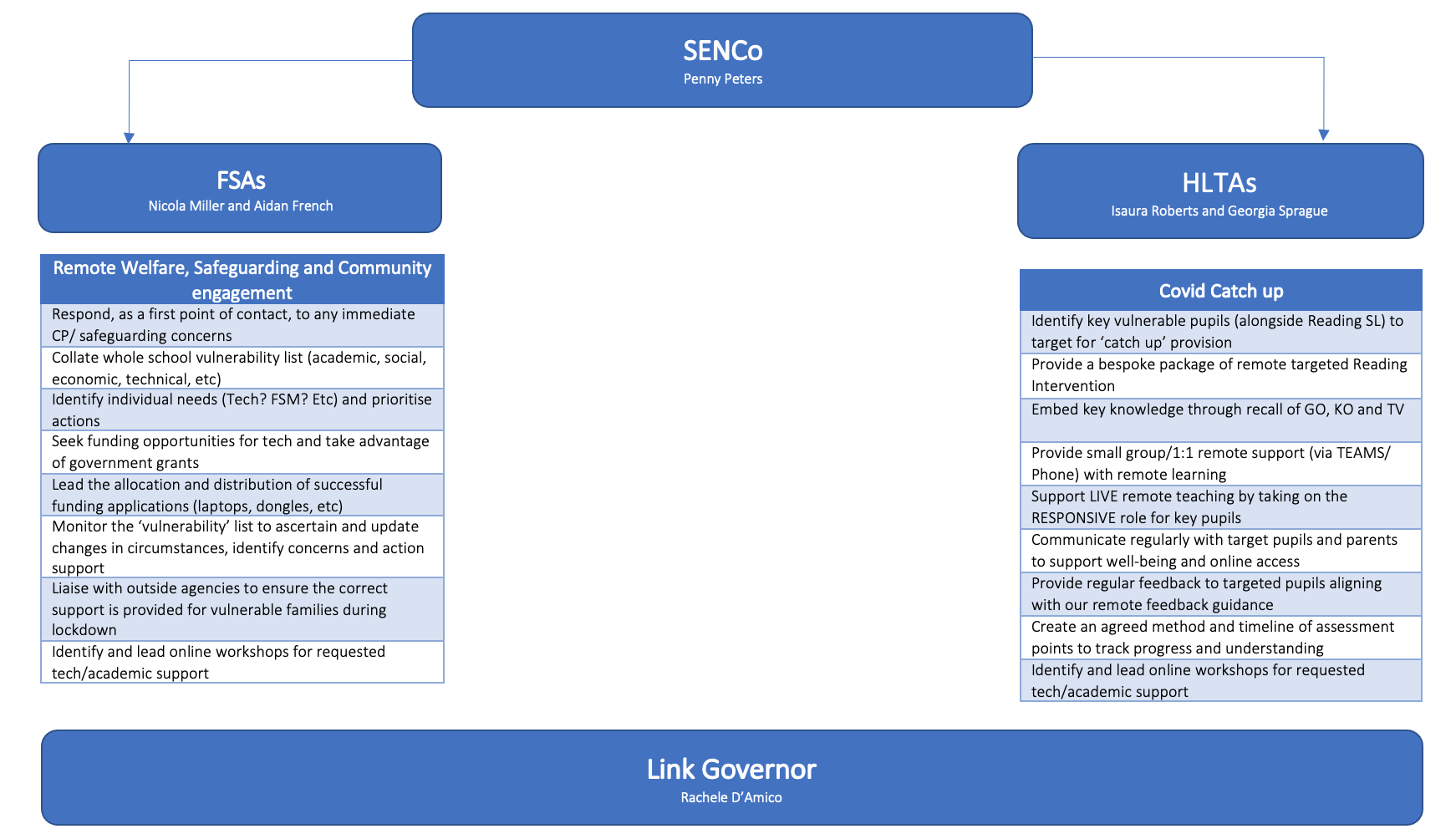Remote Learning
Remote Learning Strategy
At Mayflower, we aim to provide a robust remote learning package for pupils who may have to work away from the school site. The remote education provided will be equivalent in length to the core teaching pupils would receive in school and will include both pre-recorded and live lessons, as well as time for pupils to complete tasks and assignments independently.

The amount of remote education provided for each Year group is:
- Year N: 1hr 50min
- Year R: 1hr 50min
- Year 1: 4hrs 20min
- Year 2: 4hrs 20min
- Year 3: 4hrs 20min
- Year 4: 4hrs 20min
- Year 5: 4hrs 50min
- Year 6: 4hrs 50min
(Advised: Key Stage 1: 3 hours a day on average across the cohort, with less for younger children and Key Stage 2: 4 hours a day)
Our remote provision is based on the same roadmap as our ‘in school’ provision, ensuring, as far as we can, that pupils learning remotely will not be at an academic disadvantage to those who are accessing ‘in school’ provision. Lessons are sequenced and planned through our MCA planning process, where each step carefully considers the progression of key knowledge and skills – quality assuring purpose and content to enable access for all.
We have chosen to deliver the remote provision via the digital platform of Microsoft TEAMS, as it provides interaction (both LIVE and pre-set), assessment and feedback opportunities. All staff have been trained and are now confident at using it alongside their ‘in school’ teaching – whether it is working from the school site or remotely from home. Systems have been set up to allow our teachers to remotely reflect (on a daily basis) on misconceptions and progress, as well as providing the opportunity to share their own technical questions or top tips.
We recognise that for some families there may be barriers to digital access. Therefore, we will:
- Communicate with all families within our Mayflower Community and identify those who are ‘digitally vulnerable'.
- Seek funding opportunities and take advantage of government grant schemes available for digital access.
- Loan out school-owned digital technology along with appropriate usage agreements.
- Provide printed resources, such as textbooks, workbooks and timetables, to structure learning, supplemented with other forms of communication to keep pupils on track or answer questions about work.
- Where necessary, some pupils may have difficulty in engaging with remote learning. These pupils will be identified swiftly and considered within the ‘vulnerable’ category, therefore entitling them to a place ‘in school’.
- Implement a rigorous monitoring system – checking (on a daily basis) whether pupils are engaging with their remote timetable; attending live meetings; completing set assignments; accessing the 4 APPS. Where this is not the case, our Remote Learning Engagement Team will work with families to rapidly identify effective solutions (workshops, rehearsals, 1:1 support, coaching, scheduled reviews, etc)
Our movement into remote education will be a seamless transference from the pedagogy which already underpins our Teaching and Learning model at Mayflower (Total Teaching). It will continue to:
- provide frequent, clear explanations of new content, delivered by a teacher or through high-quality curriculum resources
- provide opportunities for interactivity, including questioning, eliciting and reflective discussion
- provide scaffolded practice and opportunities to apply new knowledge
- enable pupils to receive timely and frequent feedback on how to progress, using digitally facilitated or whole-class feedback where appropriate
- use formative and summative assessment to ensure teaching is responsive to pupils’ needs and addresses any critical gaps in pupils’ knowledge
- avoids an over-reliance on long-term projects or internet research activities
Teachers at Mayflower are expected to comply with the school’s working conditions and are responsible for the quality of remote teaching and the provision the pupils receive (as stated in the LAT Remote Learning Policy). Staff are expected to personalise learning, in order to ensure access for all and are required to have a considered approach to feedback, which aligns with the school’s agreed policy. Feedback should follow Mayflower’s PERMS rationale but is not expected for every piece of work ‘handed in’. Feedback should be carefully selected so that it is purposeful in either moving the pupils’ learning forward and/or used as a tool for teacher assessment.
Teachers and Teaching Assistants will work together to cover the three essential roles needed to enable an effective teaching and learning environment, in accordance with Mayflower’s ‘Triad Teaching’ model.
Targeting (Triad) Teaching | Working effectively in remote team
During the pandemic, remote teaching became an essential part of the learning day. It is important that should the situation arise again where remote learning is needed, we reflect on how our ‘in class’ pedagogy transfers into the remote world. Triad Teaching is a key tool in approaching our teaching. Just as in the physical classroom, adults will be assigned Triad roles (regardless of the actual number of adults involved) - roles which will enable a rich and inclusive learning environment for all participants.
What might this look like?
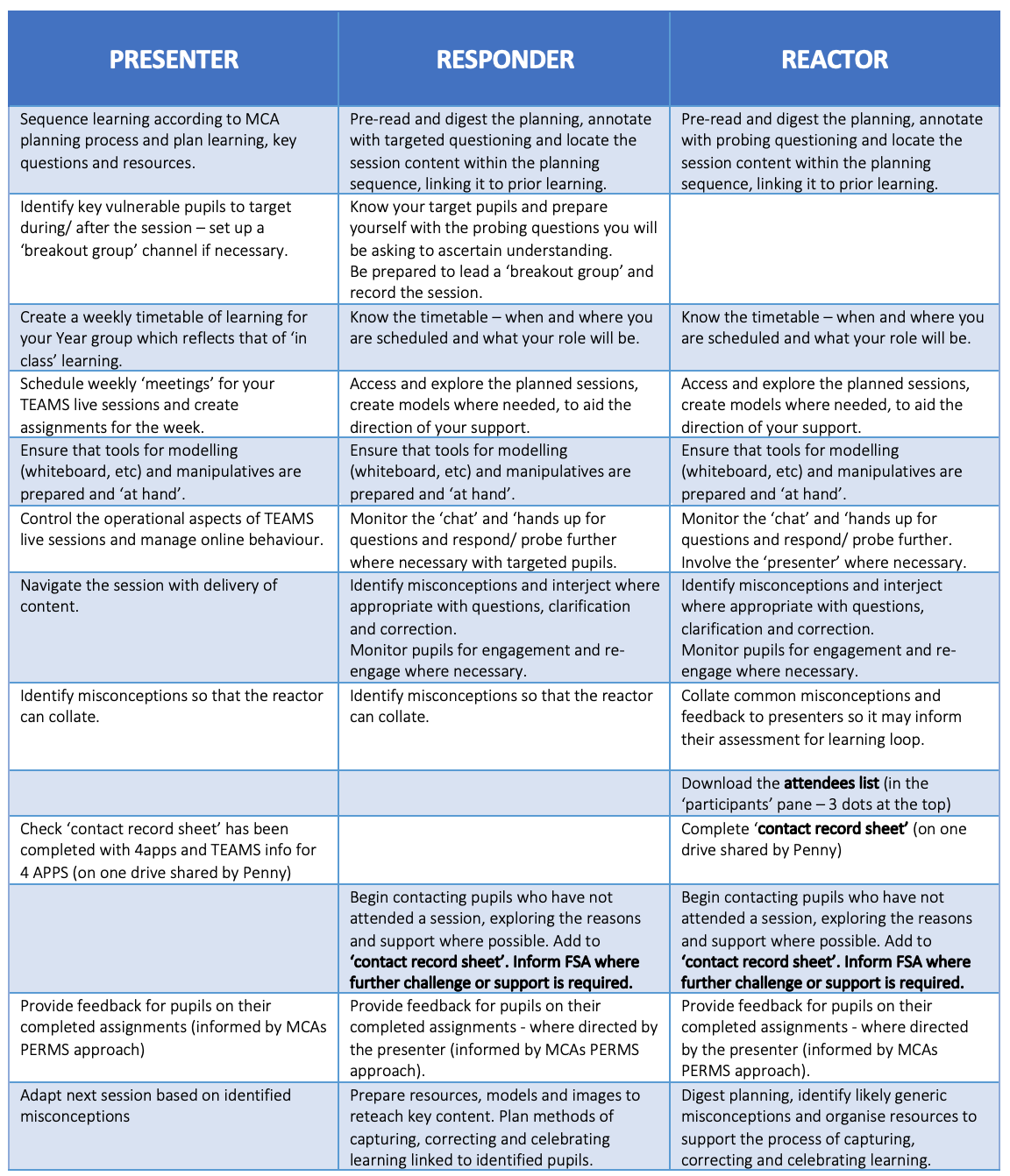
Assessment for Learning Loop
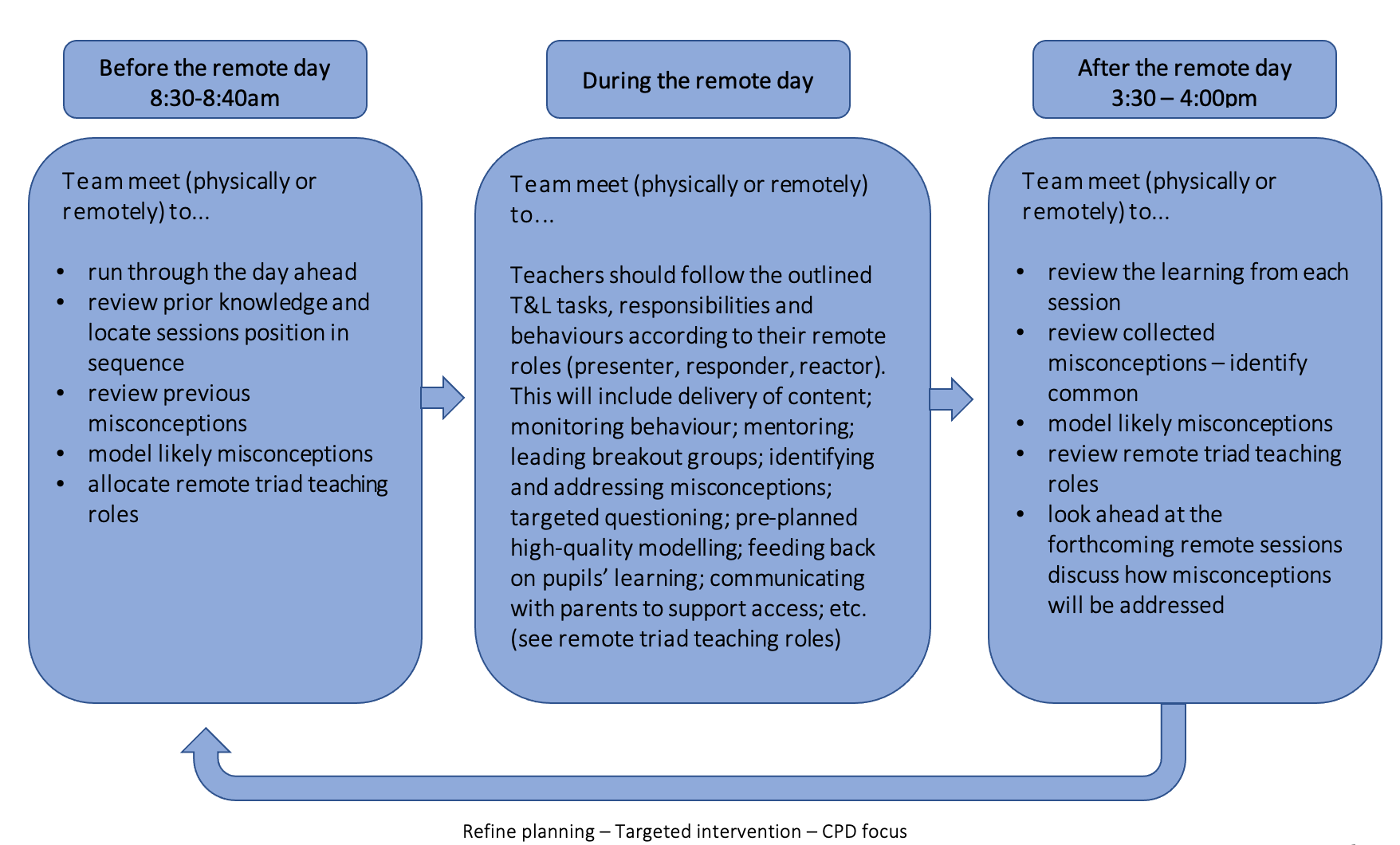
4C’s | Communicating our class plan for a remote curriculum
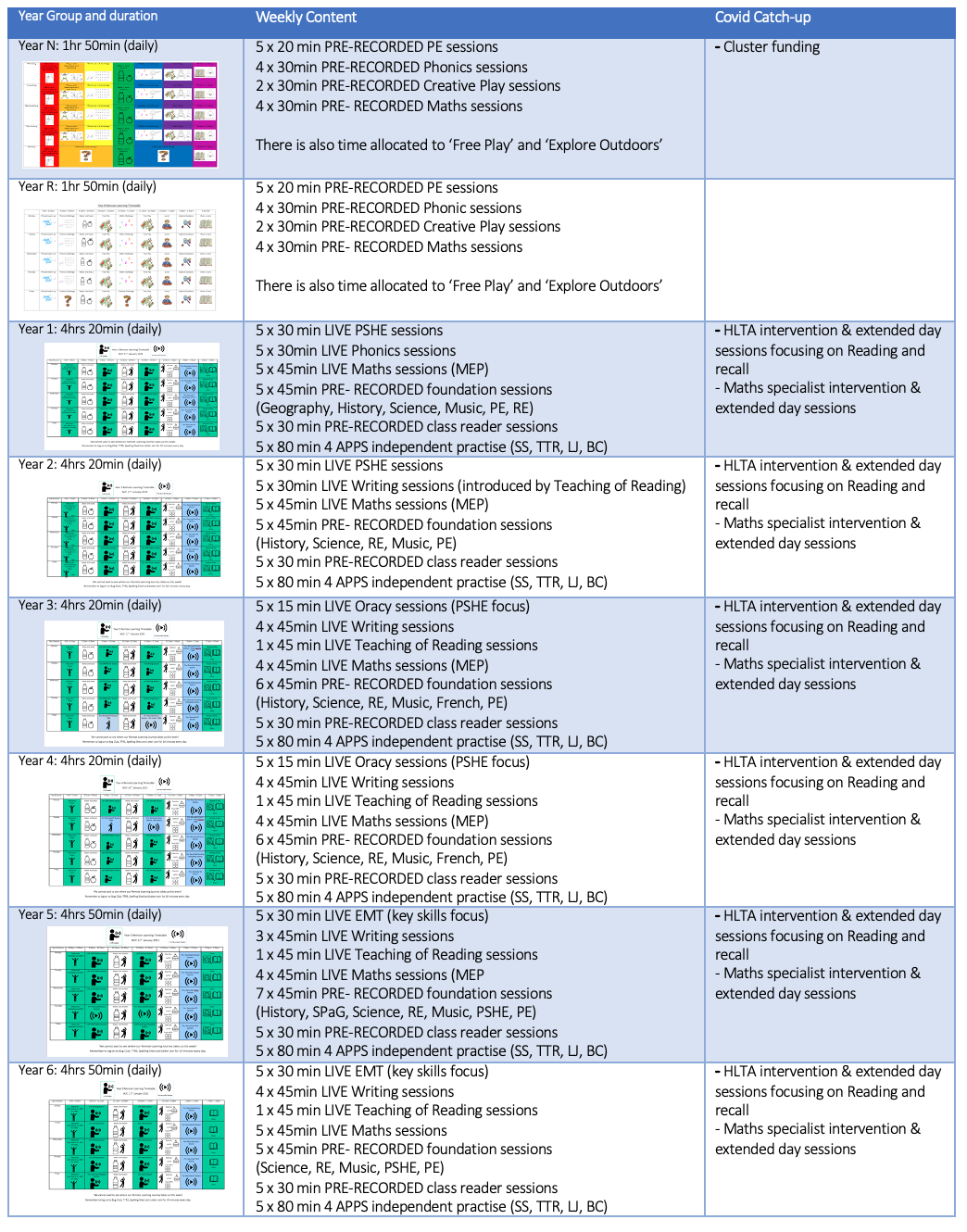
Delivering remote education safely
Keeping children safe online is essential. The statutory guidance keeping children safe in education provides schools and colleges with information on what they should be doing to protect their pupils online.
Support on delivering online remote education safely is available from:
- safe remote learning, published by SWGfL
- safe remote learning, published by LGfL
- Helping school staff to work safely online, published by the National Cyber Security Centre
- safeguarding and remote education during coronavirus (COVID-19), published by the DfE
- Keeping children safe in education
Teacher, Pupil, Parent or Carer remote usage agreement
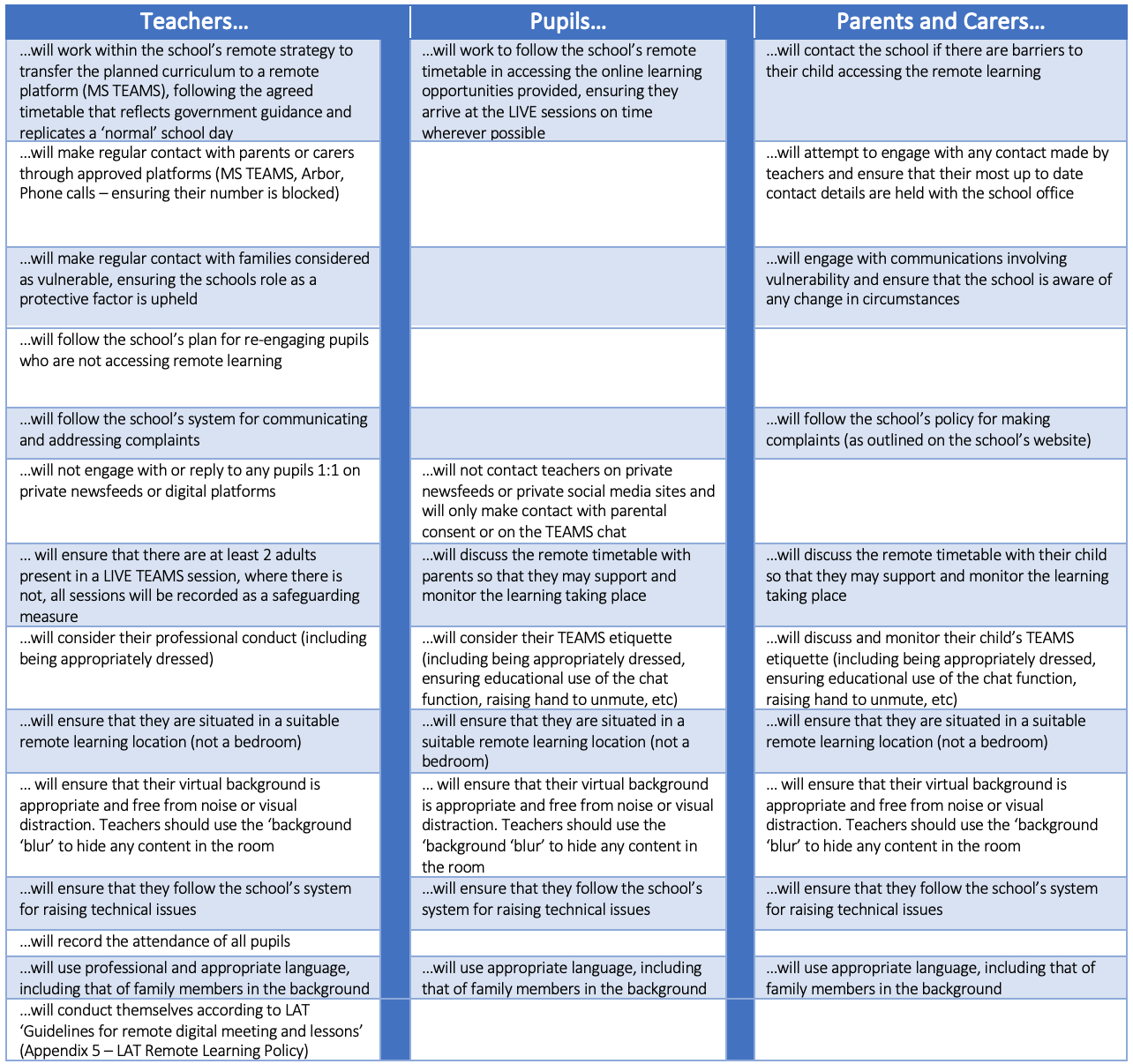
Special educational needs
For pupils with SEND, their teachers are best placed to know how the pupil’s needs can be most effectively met to ensure they continue to make progress, even if they are not able to be in school. At Mayflower, we use our 'Steps of Strategic Support' to secure the special educational provision for these pupils.
We work collaboratively with families, implementing reasonable adjustments, where necessary, so that pupils with SEND can successfully access remote education alongside their peers.
Any pupil with an EHC Plan is entitled to a place in school (either within the mainstream or Support Centre, as identified in their plan). The SENDCo will communicate with the parents to decide on the most appropriate provision for their child and if they choose not to take up their allocated place within school, a personalised remote package will be set for them and will be monitored by the SENDCo and specialist staff.
In order to identify and support pupils with Special Educational Needs, Mayflower Community Academy has devised 'Steps of Strategic Support'. Illustrated in the table below, are the stages of ‘in school’ provision for pupils with SEND, as well as the adaptations that will be made when implementing this in a remote setting.
Remote Steps of Strategic Support
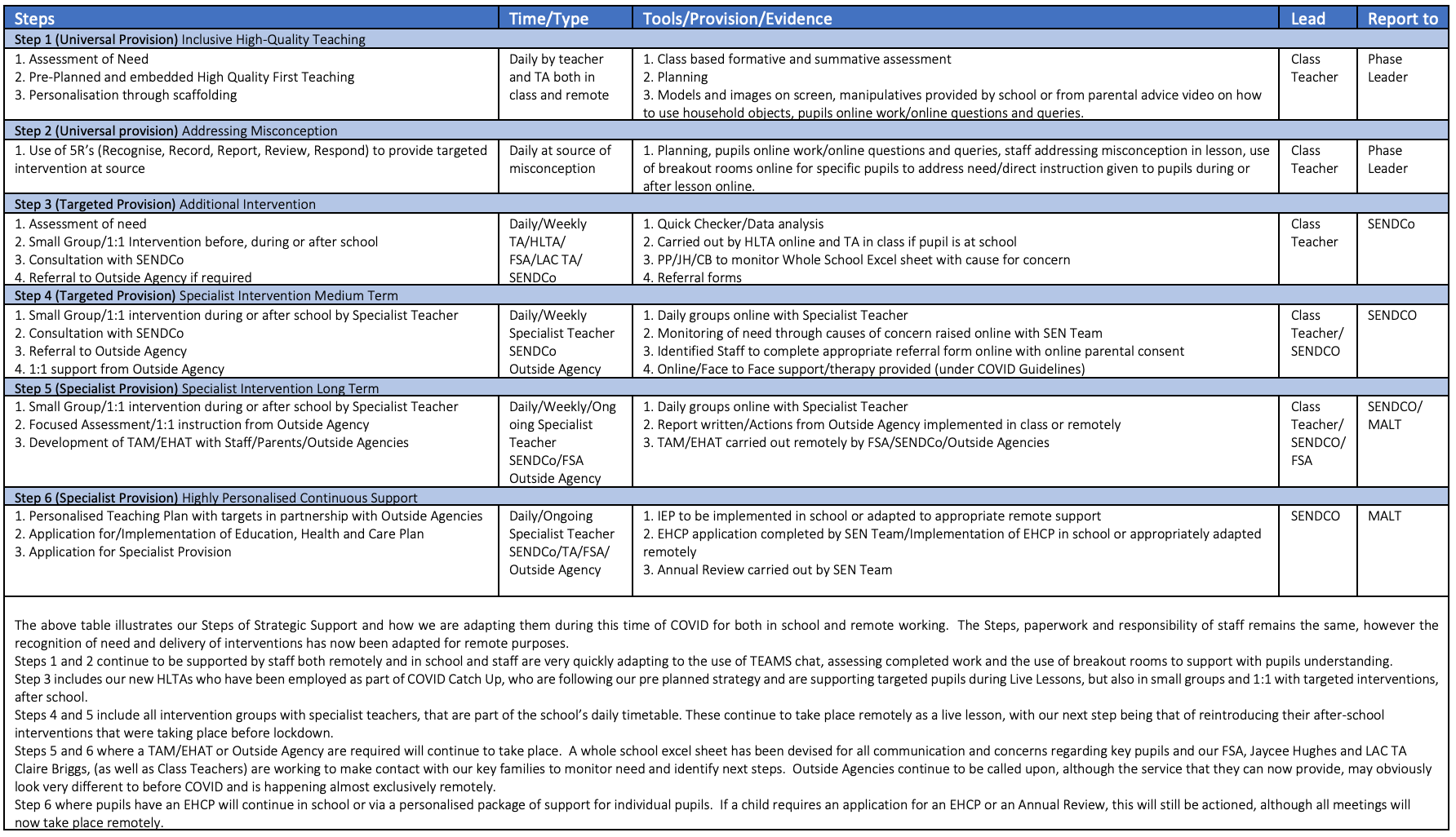
Vulnerable children
Our 'Remote Learning Engagement Team' will be set up to monitor and support pupils who have been identified as ‘vulnerable’.
Categories of vulnerability:
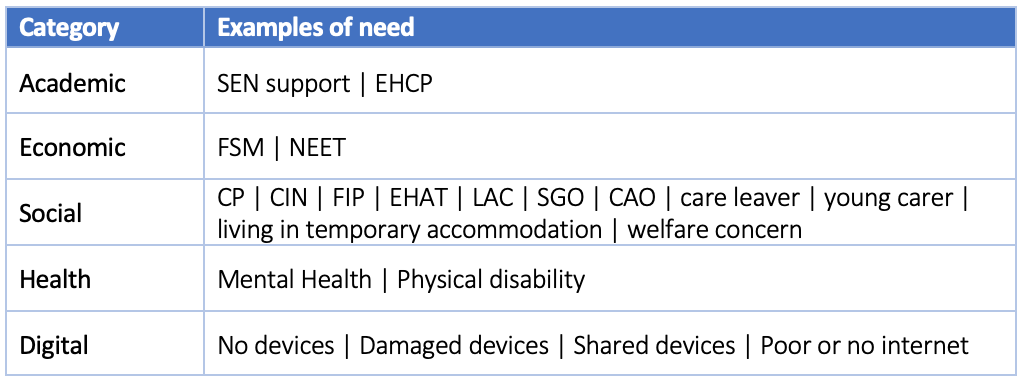
Where possible and appropriate, all vulnerable pupils will attend school, however if they remain at home, the Mayflower team will communicate and encourage these families to engage with our process of ‘remote re-engagement’, which will enable them to access remote education support, through phone contact, online workshops, personalised work packs or access to outside agencies.
If we have identified families that we have had no contact with, these pupils will be referred to our link EWO, Suzanne Hunter, who will work with the team to formulate a plan of contact.
4Cs | MCA's Remote Learning Engagement Team
Reviewing our remote education provision
In January 2021, the government published the ‘Review your remote education provision in Schools’. At Mayflower, we have used this tool to quality assure our strategy – reflecting on current remote provision and where we could improve further.
The framework has been produced to support schools in England to identify the strengths and areas for improvement in their remote education provision, and to signpost them to resources that can help them improve their practice.

